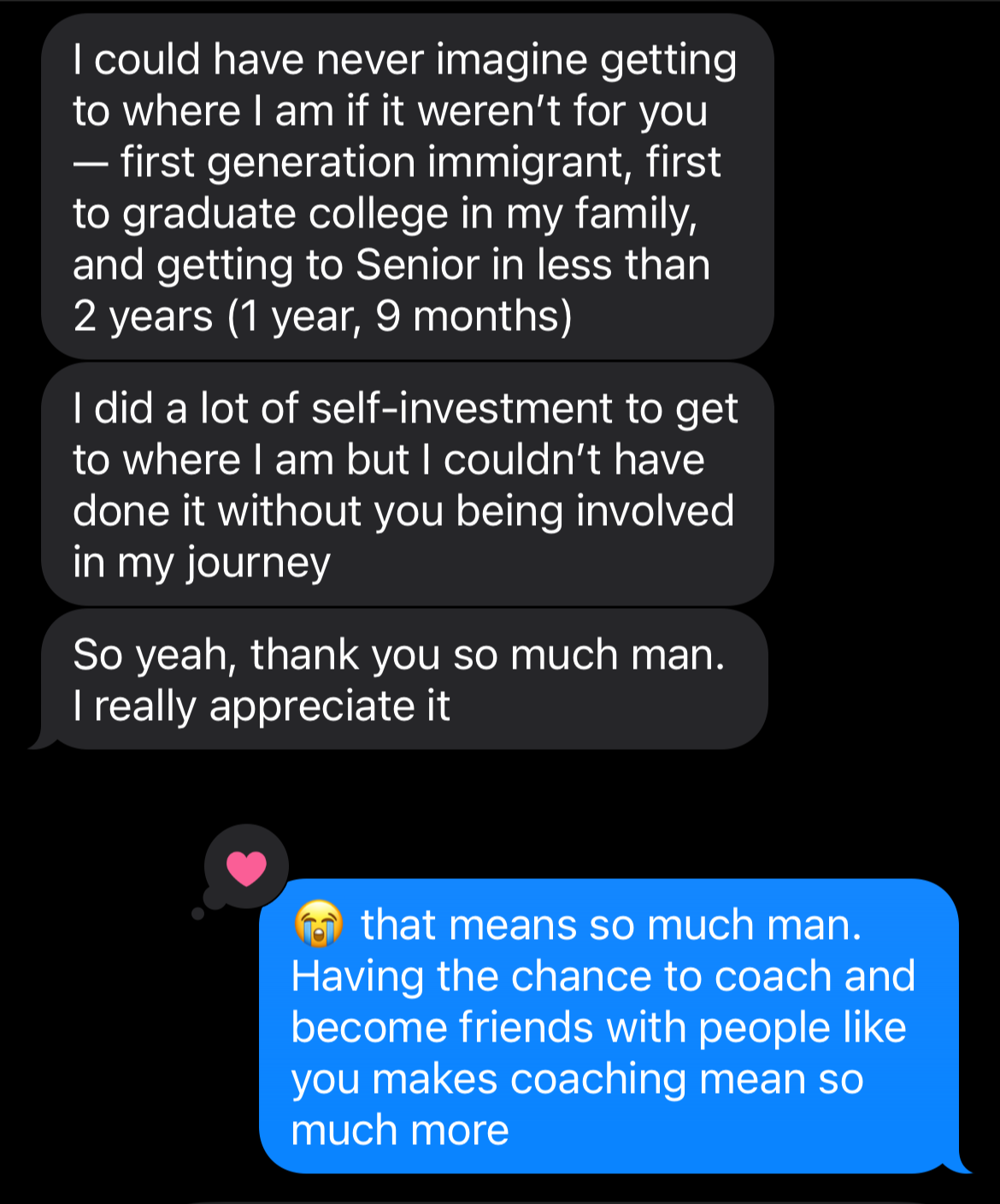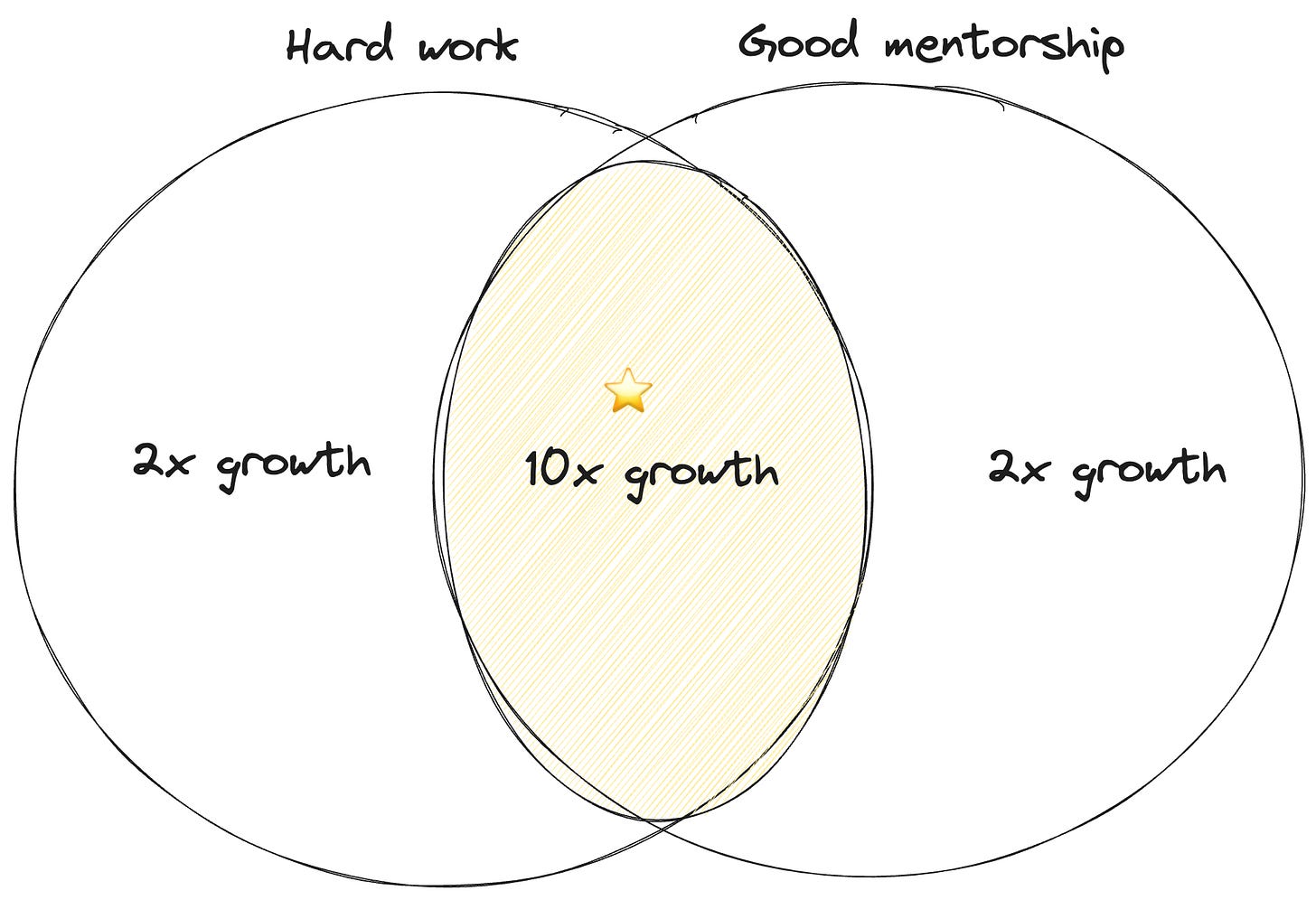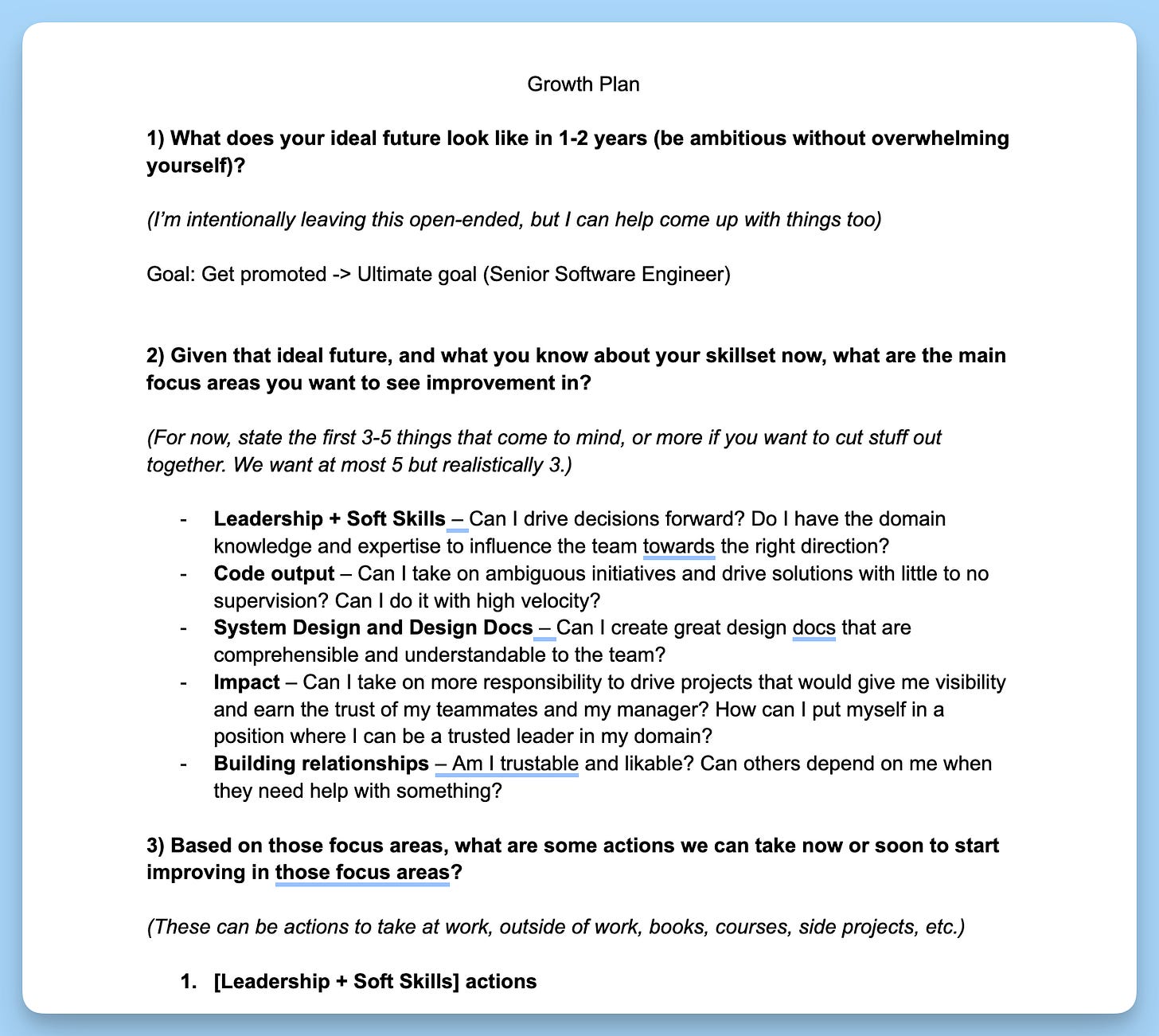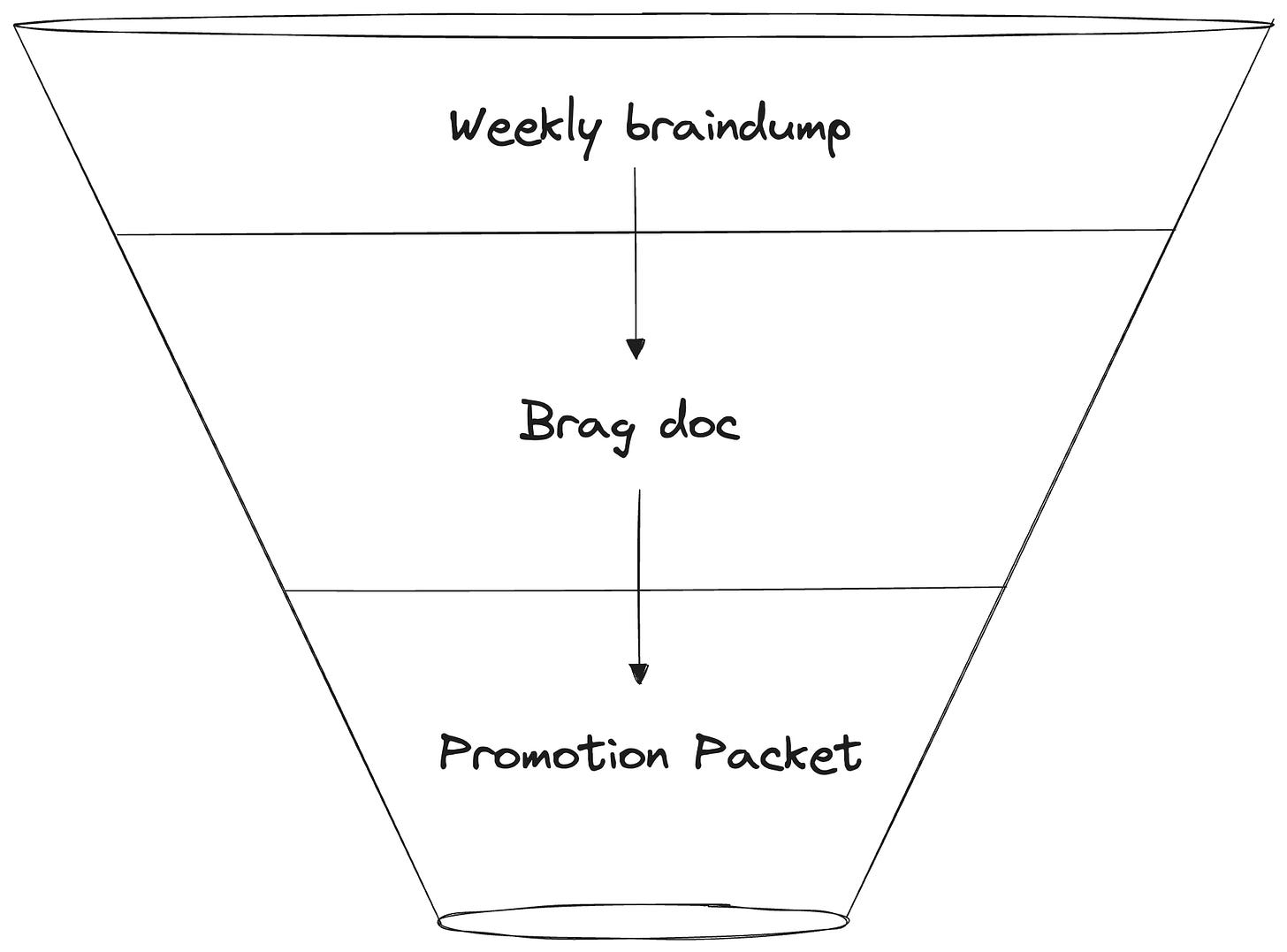My Mentee Went From Junior -> Senior Engineer in less than 2 years. Here's how.
An actionable plan for promotion no matter your level
This week I received this text message from my mentee:
My mentee started his engineering career 1 year and 9 months ago and is already a Senior engineer.
This text message meant so much to me because I relate to my mentee’s story.
While I’m not a first-generation immigrant, I am the first in my family to graduate college. It wasn’t easy to figure out the tech scene in my first job, especially since I was addicted to video games until 18 and surrounded by an extremely different culture—which was my version of “normal.”
After receiving the message, I realized a powerful formula:
Hard work + Good mentorship = Multiplicative growth
You’ve heard plenty of times before about the value of good mentorship. There’s no debating it. You also know hard (or smart) work gets you far too.
Putting them both together though, that’s the sweet spot.
In this article, I’ll share more of my mentee’s story and what we did to make it possible to go from Junior → Senior in less than 2 years.
I hope you enjoy! Let’s get into it.
⭐️ Main takeaways
An actionable formula for promotion
How to track your accomplishments in a format your manager cares about
How to be a better mentor and mentee
✅ Weekly 1:1
First, we set up a weekly 1:1.
As a mentor, I used the framework I made called C2-G2-R2 (not to confuse with R2-D2 the robot 😄)
Condition: How are you feeling? Green ✅, yellow ⚠️, orange 🔶, red 🚨?
Challenges: What was difficult recently?
Growth: What areas do you want to grow in more? How can I help?
Goals: How are you tracking on your goals, either with me or your manager?
Reflections: Is there anything you wish went better recently?
Relationships: How are things with your manager and other people you’re working with?
I’d always start with “Condition” and let my mentee drive the agenda from there, but I would steer toward outcomes to ensure we aren’t rambling or ranting. It’s their meeting, but it’s my job to ensure it’s valuable.
For some 1:1s, especially the first few, I want to make sure we cover specific pieces that set us up for success in the future. Things like understanding manager expectations, starting a brag document, and writing down long-term goals.
🚀 Growth Plan
To understand and work toward long-term goals, we formed a growth plan.
I put together a doc that had 3 questions:
What does your ideal future look like in 1-2 years? Be ambitious without overwhelming yourself.
Given that ideal future, and what you know about your skillset now, what are the main focus areas you want to see improvement in?
Based on those focus areas, what are some actions we can take now or soon to start improving in those focus areas?
Here was the result:
We identified actions we could take across each of the focus areas.
Those involved actions like:
Code areas to dig into and understand more
Speaking to the tech lead to understand how to make the most impact
Taking on a collaborative mindset in disagreements, finding ways to find mutual wins rather than approaching it with an “I’m right, you’re wrong” mindset.
My mentee did a great job already coming up with many of these on his own. It shows that you can even form a growth plan for yourself using this format!
📝 Working toward promotion
The growth plan uncovered gaps, common situations where mishaps might be happening, and actions to take on them.
The next step involved documenting wins toward the next level.
We copied the company’s next-level expectations to below the Growth Plan.
For each one, we asked, “What work has been done toward this expectation?”
I can’t reveal the promotion criteria for privacy reasons, but it was a more detailed version of the public criteria from Square below.
For each of the criteria, like “Writes, co-writes, and reviews design documentation,” we wrote down the accomplishments that have been made toward it.
We focused on the impact and how it was done.
For the criteria above on documentation, it would look like this:
Criteria: Writes, co-writes, and reviews design documentation
What: Created documentation for Payment domain models
Impact: Reduced time for new engineers to ramp up on the codebase
How (Story): As I was ramping up 2 new engineers on the team, I noticed they had many questions about how our Payment domain models work. I explained it to them, but I knew this would be a problem again when we onboard Bill in a month. The documentation I made will make for an easier ramp-up process for Bill and give the team easy access to how our Payment models work.
Or for a high-impact project, it may look like this:
Criteria: Independently responsible for the entire lifecycle of projects or features including eng design, development, and deployment
What: Led H1 Heroku → AWS migration project
Impact: Save $20 Million in infrastructure costs per year
How (Story): I set up migration templates for the team to use as we divided up the migration work. This allowed the team to follow the template depending on which part of the stack they were migrating and ensured a seamless process. After each part was migrated, I created a deployment script that had built in reversibility if anything went wrong. I also built in logging so we would be notified of an incident. The logging detected a regression and we were able to reverse it within just 10 minutes because of the reversibility built into the script.
The “What” is the 1-liner for what was accomplished. It’s what you would tell a coworker who asks what project you’re working on.
The “Impact” is the metrics, OKRs, dollars made, time saved. It’s what you would tell the CEO if you were trying to impress them.
The “How (Story)” is the meat of the work you did that made your involvement special. It’s the collaboration you did, foresight displayed, complexity handled, and ambiguity you managed. It’s the story you would tell in an interview.
Over time, each promotion criteria gets multiple stories that show readiness for the next level.
💡 Self-reflection
One of the biggest requirements for growth is self-reflection. This was my mentee’s strongest trait. He journaled through dictating out loud.
This turned into his “Weekly braindump” doc.
His braindump provided 3 main benefits:
Reflection: It helped him reflect on what went well and what he should change.
Mentorship: It helped me be a better mentor by understanding what’s going on.
Documentation: We used it to document wins to move to the brag doc.
Keying in on the 3rd point of documentation, this was the full process:
A subset of the “Weekly braindump” went into the Brag doc in bullets under each promotion criteria using “What”, “Impact”, and “How.”
A smaller subset of that goes into the Promotion Packet, a company-specific document usually presented by your manager to other senior leaders.
🤝 Manager communication
The final piece is connecting this to conversations with his manager.
He made it clear to his manager that he’d like to expand his impact and work toward a promotion over time.
Most importantly, he asked for his manager’s help in getting there. This made it a collaborative process.
Here is one approach you could take in a 1:1 conversation:
“It’s important to me to keep growing as an engineer and expand my impact on the team. I’d love to start working toward the next level and I would love your help in making the right steps toward that. Would you be open to having a discussion in the next few weeks around what that might look like?”
You shouldn’t feel bad about bringing something like this up. It’s in your manager’s interest to help you grow and make more impact. That’s why the first line is important.
In my mentee’s case, he had a conversation like this early on, shared updates to his brag doc once per month, and got feedback from his manager on the next areas he should look into.
They both had a mutual interest and his manager helped by looking for opportunities and giving actionable feedback.
My mentee put the work in on each piece of feedback, kept self-reflecting on areas he could grow more, and stayed in sync with his manager for 9 months—which was enough for his manager to feel comfortable advocating for his promotion to other senior leaders.
That’s how he got to Senior in less than 2 years.
📖 TL;DR - A plan to try for yourself
Work with your manager or a mentor to create a growth plan, identifying focus areas and actionable steps to grow in those areas.
Create a doc filled with your promotion criteria to the next level
Do a weekly reflection thinking back to what you accomplished that week
Document those in a brag doc using the “What”, “Impact”, and “How” format
Regularly meet with your manager to assess how you’re tracking toward the next level. Adjust based on feedback.
Repeat and see the wins come!
📣 Shout-outs of the week
This week I chatted with Raj Saha, Principal Architect at Amazon.
We discussed landing a job, personal reflections on what I would have done differently starting out in my career, how to get the most out of your mentor, my time management system, books I recommend, and more! I hope you enjoy 😊
The two other shout-outs I have are related:
[Free] The unspoken skill of finesse by Wes Kao on Wes Kao's Newsletter
[Paid] Answer the unasked questions by Dave Anderson on Scarlet Ink
Both of them cover understanding the “question behind the question.” When someone asks you a question, figure out the actual details they actually want to know and answer that. This is especially important in interviews, but it also matters in the meetings you have every day.
Thank you for helping get to 10k+ stars on the Path to Senior Engineer Handbook! 👏 🎉
AND for nearly getting to 60k subscribers on the newsletter. We’re at 59.4k!!!
P.S. Here are some other things which may interest you:
Newsletter sponsorships: Feel free to reply to this email or check the Sponsorship packages
Guest posts: I like featuring interesting stories that help other engineers grow. If you have a story to tell, check out my guest post guidelines and respond to this email.
Did you find this issue valuable? If so, there are two ways you can help:
You can also hit the like ❤️ button at the bottom of this email to help support me or share this with a friend to get referral rewards. It helps me a ton!







Keeping a work log aka a brag list is a great addition when it comes time for performance reviews and promotions. It makes the difference.
It makes it easier for your manager to scream for you since he has a proven track record of your achievements.
Inspiring story, Jordan ! 🙌
Awesome write up on how to grow into a senior role Jordan. It’s so true that hard work + mentorship + documenting wins + feedback iteration cycles is a great promotion path.
These are the exact steps I followed for my first promotion beyond senior. They work. 👏🏼
Huge congrats to your mentee for all the hard work they put in, and their new role! 🙌🏻